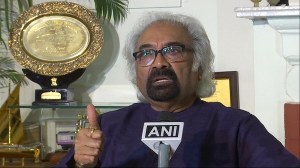- India
- International
‘Govt should ban sugarcane cultivation in Marathwada’
Renowned water conservationist and environmentalist Rajendra Singh feels the government will have to take drastic measures to tackle the recurring drought in Maharashtra. In an interview to Shubhangi Khapre, Singh, known as the ‘Water Man’, talks about drought and climate change challenges ahead.
 Rajendra Singh.
Rajendra Singh.
What do you have to say about the government’s flagship Jalyukt Shivar for drought mitigation?
The Jalyukt Shivar is an ideal water conservation project, which is essential to make Maharashtra drought-free. The concept has caught the imagination of the rural masses. The huge participation of villagers is a testimony to its success. In the first year of its introduction, Jalyukt Shivar saw public contribution of Rs 300 crore. Villagers voluntarily came forward for “shramdan” (labour). The involvement of the people helped in creating very good quality water structures. There were different models adopted as per the geographical requirements like check dams, canals, desilting and deepening and widening of rivers and farm ponds. Recently, I was travelling in Sangli Jat talukas, which are perennially drought-prone. In several talukas in Western Maharashtra, at least 40 villages out of 108 studied, we saw positive results on Jalyukt Shivar. There was water available, facilitating farmers to carry out agriculture activities.
But critics have raised questions over the project?
I have been very closely associated and following the water conservation and management through Jalyukt Shivar in Maharashtra for the last four years. I would like to make it clear that the project is good. I would also like to put on record that Chief Minister Devendra Fadnavis is absolutely committed to water conservation and making Maharashtra drought-free. In the first two years when the project was approached scientifically with public participation, it yielded excellent results. But since 2017, wherever such projects were driven by contractors, it was a failure. Contractor-driven work was unscientific and profit-oriented. There is a difference when villagers own up a project. It works. But if it is driven by contractors, it fails. Unlike villagers, contractors don’t display the same concern or sensitivity to the water cause. Therefore, it was subjected to criticism from some quarters. But I would still maintain Jalyukt Shivar, if enforced correctly, will help combat drought.
What are the reasons for recurring drought in Maharashtra?
At the outset, the recurring drought can be attributed to poor rain. But I always maintain that monsoon alone is not responsible for drought. Droughts are a man-made phenomenon. In olden times, farmers treated water as something sacred. It was used for agriculture purposes to produce foodgrain to serve the requirement of people. But in the last 40 years, we have turned agriculture into a business essentially for profit-making. When resources are over-exploited, it invites trouble. We have drawn water from acquifers, which are our reserves. Water is drawn from 800-1,000 feet below the ground, which is a very serious matter.
What measures will you recommend for Maharashtra?
The government should take stringent water management measures. Water-intensive crops like sugarcane should be permanently banned across all drought-prone regions. In Marathwada region, where majority of the districts are drought-hit, sugarcane should be banned forever. I’m not against any crop. But how can you allow one cash crop to guzzle all the water at the cost of creating a situation where drinking water becomes a problem for the masses. In regions where rainfall is high and which are conducive for sugarcane, the government should allow it, subject to drip irrigation. If necessary, the government should bring a legislation to enforce the harsh decisions. Decisions should be judicious based on rainfall and geographical conditions. Water conservation projects which help collect every drop of rainwater should be preserved. If cultivation of water-intensive crops like sugarcane continues, underground water tables will deplete further. It will create havoc.
Your emphasis is on crop pattern change…

The government will have to come out with a long-term plan for crop patterns adaptable to climate changes. It should be a minimum 12-year plan. Climate change is the biggest challenge world over. Unfortunately, we are not doing enough to provide long-term sustainable solutions to farmers. There are plenty of options. Tur, jowar, bajra, channa (gram). Why don’t we encourage farmers to cultivate sarsoo (mustard), which requires less rain and has a good market. This is just one example. In the next few decades, our efforts should be on water-recharge projects to ensure groundwater tables are protected. Soil erosion and soil health are other aspects which have to be treated with greater urgency and taken up seriously.
What are the practical problems you foresee in treating water as an economic commodity?
Preservation of nature should be accorded highest priority as we undertake development work. We have destroyed tree cover. Our forests are shrinking. Mountains and hills have lost tree cover. Trees play a significant role in water conservation, which is being completely overlooked. Recycling of water for industrial use should be made compulsory. At present, industries, including sugar mills, are drawing huge amounts of water from all possible sources such as rivers and dams.
Does it display a lack of political will?
Fortunately, the Maharashtra CM is passionate about water conservation and preservation… But I would not vouch the same commitment about others in the government. Now, let me give an example of the Reserve Bank of India. They have employees whose skills are upgraded regularly through training. Till now, we have done nothing for water management and conservation. We need to create skilled workers for water management through proper training. They should have adequate knowledge and commitment. Water management should be taught in school and colleges.
Apr 24: Latest News
- 01
- 02
- 03
- 04
- 05







































